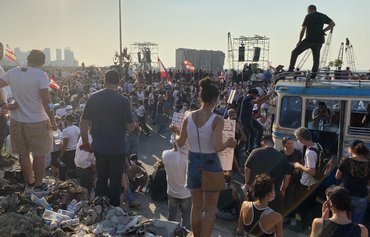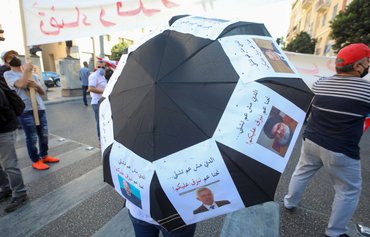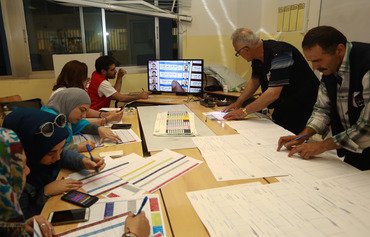BEIRUT -- Relations between Lebanon's Free Patriotic Movement (FPM), a Christian political party founded by President Michel Aoun, and its political allies, Hizbullah and the Amal movement, are under increasing strain.
Long-simmering tensions between the FPM and the so-called "Shia duo" exploded into public view on January 2 when FPM chief -- Aoun's son-in-law, Gebran Bassil -- turned on Hizbullah and Parliament Speaker Nabih Berri.
In a televised address, Bassil threatened to break the FPM's alliance with Hizbullah and rebuked the Iran-backed party over its weapons and its recent disruption of government meetings.
Responding the next day to Bassil's verbal assault, Hizbullah chief Hassan Nasrallah said he was keen to adhere to and develop the Mar Mikhael agreement of February 6, 2006, upon which their alliance is based.
![The FPM's alliance with Hizbullah and Amal has been showing signs of strain. This file photo from May 15, 2008, shows Amal party deputy Ali Hassan Khalil, Hizbullah chief Hassan Nasrallah's political adviser Hajj Hussein Khalil, and FPM leader Gebran Bassil, who was at the time political advisor to Michel Aoun, at a news conference in Beirut. [Hassan Ammar/AFP]](/cnmi_am/images/2022/01/18/33573-FPM-Amal-Hizbullah-600_384.jpg)
The FPM's alliance with Hizbullah and Amal has been showing signs of strain. This file photo from May 15, 2008, shows Amal party deputy Ali Hassan Khalil, Hizbullah chief Hassan Nasrallah's political adviser Hajj Hussein Khalil, and FPM leader Gebran Bassil, who was at the time political advisor to Michel Aoun, at a news conference in Beirut. [Hassan Ammar/AFP]
Aoun and Nasrallah signed the agreement, which aims to address issues such as state building, corruption and establishment of an independent judiciary.
"We chose the Mar Mikhael understanding over Tayyouneh," Bassil said during the conference, referring to the clashes that took place in October when Hizbullah and Amal elements stormed through a Christian enclave in Beirut.
The street fighting, in which seven people were killed and more than 30 were injured, kicked off amid a Hizbullah/Amal rally to demand the dismissal of Judge Tarek al-Bitar, who is investigating the Beirut port explosion of August 2020.
Fragile alliance
Bassil indicated his party was sticking with the Shia duo rather than siding with the Christian Lebanese Forces party, who were involved in the Tayyouneh incident.
"We're still with this choice, but where is the practical translation of the Mar Mikhael agreement? Where is state building? Can it happen through covering up for corruption?" he said.
"We tried to improve the [Mar Mikhael] memorandum of understanding behind closed doors, as we do not want to abolish it, but it no longer meets our challenge," he said.
The FPM and Hizbullah have had frequent differences and disagreements.
Last February, the FPM said its understanding with Hizbullah had not succeeded with regard to the project of state building and the rule of law.
In July, Bassil warned, "The existence of weapons other than the army's weapons is not normal. This situation is extraordinary and must not continue."
The dispute between the two sides has intensified in recent weeks.
They have disagreed over a three-month Hizbullah/Amal boycott of cabinet sessions in objection to al-Bitar, which has held the legislative process hostage.
(In a joint statement Saturday (January 15) the Shia duo said they were ready to return to government meetings.)
They also have had differences over the election law, especially after Bassil appealed a parliamentary amendment that would allow expats to cast their ballots for 128 MPs in the 2022 elections, instead of only six.
The Constitutional Council declined to issue a ruling on the appeal, which Bassil regarded as "a clear political decision by a system" led by Hizbullah and Amal.
'Divergences prevail'
"Many divergences prevail in our [FPM's] relationship with the Shia duo," said Lebanese MP Alain Aoun of the Strong Lebanon bloc.
This is because they are in effect "one team and have one voice on all the issues put forth", he told Al-Mashareq.
"This left scars in our relationship with Hizbullah that were manifested at several points," he said, noting the party's disruption of government, failure to rule on the election amendment appeal, and call for al-Bitar's dismissal.
"These problems and other sensitive issues have adversely affected the relationship between us," he said.
The Shia duo should have sought to resolve these issues without "taking the government hostage", he said.
Aoun said Hizbullah, as a political entity, "bears responsibility for Lebanon's problems, the collapse and countless disasters that have befallen it" due to its failure to find solutions for them through national consensus.
"It turned out that no one side is capable of addressing [these problems], and the party's positions and performance further complicate matters," he said.
'Fundamental disagreement'
"There is a fundamental disagreement between the FPM and Hizbullah over many issues, all of which relate to the failure to implement what was agreed upon in the Mar Mikhael understanding," said political analyst George Shaheen.
There have been reports that the two sides recently held meetings to "develop" the agreement, he told Al-Mashareq.
He said the main dispute is "between the FPM and Parliament Speaker Nabih Berri, an ally of Hizbullah", he said. "This is no secret, and everyone knows that there are no normal relations between the two sides."
Problems abound between Berri and the FPM, Shaheen said, starting with the accusation of corruption Bassil levied against Berri, and leading up to, but not ending with, the case of al-Bitar.
But Shaheen predicted, "Bassil's attack on Hizbullah and the threat to dissolve his alliance [with the party] will not go beyond words."
"The matter will end with Hizbullah supporting the FPM in the parliamentary elections, not out of love for the movement but rather to maintain the status quo," he said.
Political machinations
Bassil and Aoun have from time to time alluded to divergences between the FPM and Hizbullah, political analyst Tony Issa told Al-Mashareq.
But this "is the first time that Basil expressly discusses the [Mar Mikhael agreement] to show the divergence between them is not out of the question, and that the upcoming stage will witness more independent political actions".
Bassil's words were a political machination to boost his image for the upcoming parliamentary elections, Issa said, "to make him more acceptable to the Lebanese, Arab and international public opinion".
They also could be a message to the United States to "lift the sanctions imposed on him on the grounds that he is no longer in the same camp with Hizbullah".

![A protester in Baabda holds a cartoon of President Michel Aoun, Parliament Speaker Nabih Berri and Hizbullah chief Hassan Nasrallah sitting atop a national flag during a September 12, 2020 demonstration against the lack of progress in the Beirut port explosion probe. [Anwar Amro/AFP]](/cnmi_am/images/2022/01/18/33579-lebanon-shia-duo-600_384.jpg)






